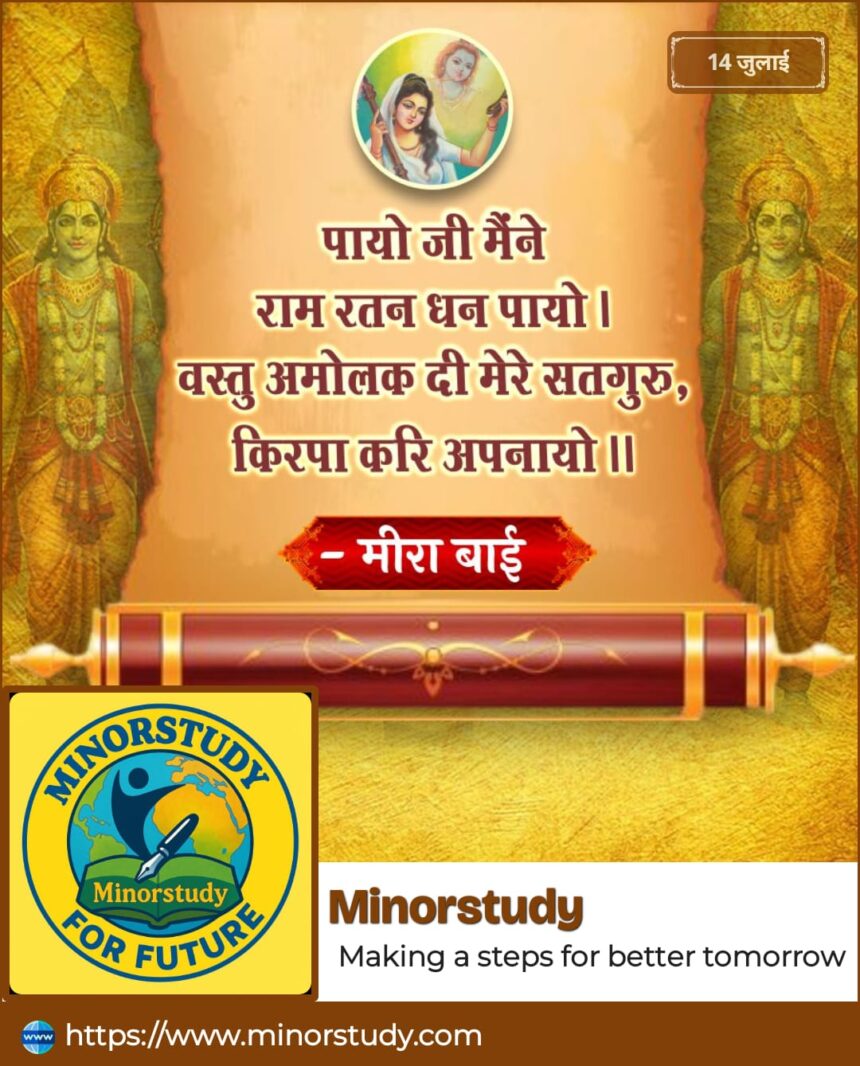🌸 7 Priceless Lessons from Meera Bai That Inspire Pure Devotion and Inner Joy
In the radiant history of Indian spiritual heritage, few names shine as brightly and soulfully as Meera Bai — the mystic saint, poet, and lover of Lord Krishna. Her life was not just a story but a living flame of selfless love, divine surrender, and fearless devotion. Her famous words:
- 🕊️ Who Was Meera Bai?
- 🗓️ Timeline of Meera Bai’s Life
- 📖 History and Devotion
- ✨ Key Facts About Meera Bai
- 💎 The Meaning Behind “Priceless Wealth of Rama”
- 🌼 7 Priceless Teachings of Meera Bai
- 1. 💖 True Love Is Divine, Not Possessive
- 2. 🌊 Devotion Is Higher Than Social Status
- 3. 🛡️ Spiritual Courage Is a True Virtue
- 4. 🧘♀️ Detachment from the Material World
- 5. 🎶 Bhajan Is a Path to God
- 6. 🌈 Grace Is Greater Than Effort
- 7. 🌟 Union with God Is the Soul’s Goal
- 🎇 Observances & Legacy
- 🙏 Heartfelt Wishing Message
- 🌍 Daily Life Impact of Meera Bai’s Teachings
- ❓ Frequently Asked Questions (FAQs)
- Q1. Was Meera Bai married?
- Q2. Why is Meera Bai considered a saint?
- Q3. What are some of Meera Bai’s most famous bhajans?
- Q4. Where did Meera Bai attain samadhi?
- Q5. What is Meera Bai’s relevance today?
- 🪷 Conclusion: Meera Bai — The Poetess of Divine Love
“I have attained the priceless wealth of Rama. My Satguru has given me a priceless thing, by His grace he has accepted me.”
…reflect her gratitude, bhakti (devotion), and spiritual awakening.
In this article, we explore the history, timeline, teachings, significance, observances, and societal impact of Meera Bai — written in a way that touches both the heart and mind.
🕊️ Who Was Meera Bai?
Meera Bai (c. 1498 – c. 1547) was a Rajasthani princess, poetess, and saint, renowned for her unwavering devotion to Lord Krishna.
Birthplace: Merta, Rajasthan
Spiritual Guru: Ravidas Ji (Sant Ravidas)
Ishta Devta (Deity of Worship): Lord Krishna (as Giridhar Gopal)
Composed in: Rajasthani, Braj Bhasha, and Hindi
Spiritual Path: Bhakti Yoga
She rejected royal comforts, societal norms, and even threats from her own family to walk the path of divine love.
🗓️ Timeline of Meera Bai’s Life
| Period | Milestone |
|---|---|
| c. 1498 | Born in Merta, Rajasthan to Rathore Rajput family |
| c. 1505 | At age 7, spiritually married to Lord Krishna |
| c. 1516 | Married Prince Bhoj Raj of Chittorgarh (unwillingly) |
| c. 1521 | Widowed and began her open devotion |
| 1520s–1540s | Wandered across Vrindavan, Dwaraka, Mathura singing bhajans |
| c. 1547 | Merged into Lord Krishna’s idol in Dwaraka (as per tradition) |
📖 History and Devotion
Meera’s love for Krishna was not metaphorical — it was her only reality. At a young age, she decided Krishna was her eternal husband. When forced into marriage, she refused conjugal life, lived like a yogini, and often defied the palace’s restrictions.
Despite being poisoned, insulted, and imprisoned, her devotion only deepened. Her bhajans (devotional songs) express longing, surrender, joy, pain, and divine union.
✨ Key Facts About Meera Bai
Composed over 1,300 bhajans still sung across India
Recognized in Bhakti Movement alongside Kabir, Tulsidas, Surdas
Guru Sant Ravidas helped shape her egalitarian and devotional worldview
Inspired movements of women’s spiritual liberation
Revered in Vaishnavism, Sikhism (mentioned in Guru Granth Sahib), and folk traditions
💎 The Meaning Behind “Priceless Wealth of Rama”
In this famous line, Meera refers to:
“Rama” as the supreme truth or Lord Krishna
“Priceless wealth” as pure devotion and inner union
“Satguru” as the one who guides the soul to the divine
“Acceptance” as spiritual liberation (moksha) through grace
It’s the essence of bhakti: you do not earn grace — you receive it through surrender.
🌼 7 Priceless Teachings of Meera Bai
1. 💖 True Love Is Divine, Not Possessive
Meera’s love was not worldly attachment but divine connection. She saw Krishna as her eternal beloved.
➡ Lesson: Let your love uplift your soul, not bind your ego.
2. 🌊 Devotion Is Higher Than Social Status
She rejected royal luxuries for spiritual freedom, often mingling with saints and untouchables.
➡ Lesson: Bhakti unites all — caste, gender, status are illusions before the divine.
3. 🛡️ Spiritual Courage Is a True Virtue
Facing exile, slander, and poison, she still sang with joy.
➡ Lesson: Be fearless when walking your true path — even if it’s lonely.
4. 🧘♀️ Detachment from the Material World
Meera left her palace, titles, and jewelry for Krishna’s love.
➡ Lesson: True wealth is internal, not external.
5. 🎶 Bhajan Is a Path to God
Her songs were her prayers. She sang for hours — sometimes days.
➡ Lesson: Express your soul through art, devotion, and surrender.
6. 🌈 Grace Is Greater Than Effort
She says the Guru “gave her something priceless”, meaning grace transcends karma.
➡ Lesson: Do your best, but leave the results to the divine.
7. 🌟 Union with God Is the Soul’s Goal
Her final merging with Krishna’s idol in Dwaraka symbolizes ultimate liberation.
➡ Lesson: Seek not pleasure — seek oneness with the eternal.
🎇 Observances & Legacy
Meera Bai Jayanti: Celebrated on Sharad Purnima (October–November)
Her bhajans are sung during Navratri, Krishna Janmashtami, and satsangs
Temples and ashrams in Vrindavan, Dwaraka, and Rajasthan keep her memory alive
Padavali (Bhajan collections) are taught in classical music schools
🙏 Heartfelt Wishing Message
🌸 On the path of divine love, may Meera Bai’s songs echo in your soul.
🌿 May you too receive the “priceless wealth” of devotion, and may your Satguru guide you with grace.
🌺 May your life become a bhajan — a song sung to the eternal.
🌍 Daily Life Impact of Meera Bai’s Teachings
🌱 Personal:
Encourages emotional healing through devotion
Brings clarity on what truly matters in life
Builds inner strength to face society and suffering
👨👩👧👦 Social:
Breaks gender and caste boundaries
Promotes equality and love over hierarchy
Encourages women to express spiritual independence
❓ Frequently Asked Questions (FAQs)
Q1. Was Meera Bai married?
Yes, to Prince Bhoj Raj of Chittorgarh, but she renounced worldly marriage for her spiritual union with Krishna.
Q2. Why is Meera Bai considered a saint?
Her life of unconditional devotion, poetic genius, and fearless spirituality places her among India’s greatest saints.
Q3. What are some of Meera Bai’s most famous bhajans?
“Mere To Giridhar Gopal, Dusu Nahi Koi”
“Payo Ji Maine Ram Ratan Dhan Payo”
“Hari Tum Haro Jan Ki Peer”
Q4. Where did Meera Bai attain samadhi?
Tradition holds she merged with Krishna’s idol at Dwaraka, attaining final liberation (moksha).
Q5. What is Meera Bai’s relevance today?
She is a symbol of divine feminism, poetic rebellion, and eternal love — deeply relevant in our spiritual, emotional, and societal struggles.
🪷 Conclusion: Meera Bai — The Poetess of Divine Love
Meera Bai’s life wasn’t just poetry — it was a living prayer. Her soul-drenched songs continue to touch hearts centuries later. In her selfless devotion, she reminds us:
“The richest one is not who owns lands or gold, but the one who owns love for the Lord.”
If you have found the priceless wealth of devotion, hold it close — and sing your soul’s song to the One who already accepts you.








